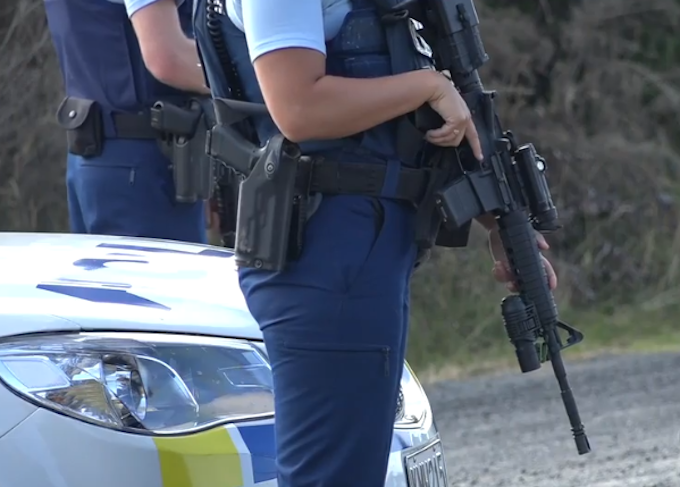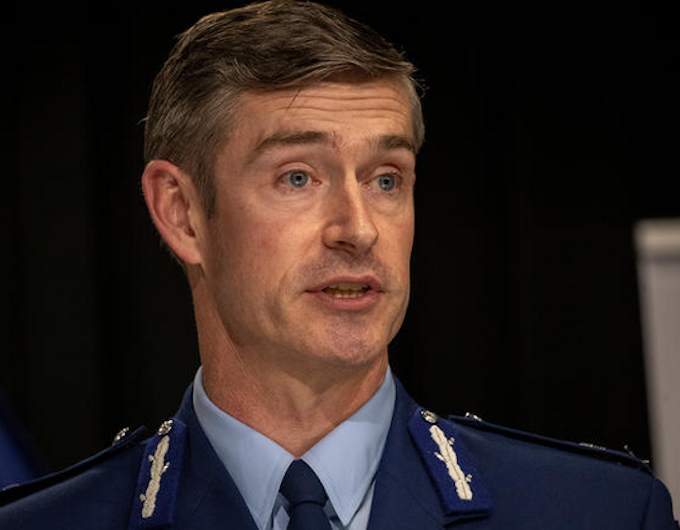
By RNZ News
Police Commissioner Andrew Coster announced today that Armed Response Teams will not be part of the New Zealand policing model in the future.
A trial of the teams of police carrying firearms (ARTs) were launched in Counties Manukau, Waikato and Canterbury last year and ended in April.
In recent days, mass protests across New Zealand against police brutality – sparked by the killing of African-American George Floyd in the US on May 25 – have renewed opposition to armed police and the response teams specifically.
READ MORE: Democrats to unveil sweeping police reforms in US in wake of Black Lives Matter protests
Commissioner Coster said the decision to scrap the teams was based on preliminary findings from the trial evaluation – which is yet to be completed – feedback from the public, and consultation with community forum groups.
“It is clear to me that these response teams do not align with the style of policing that New Zealanders expect,” Coster said.
“We have listened carefully to that feedback and I have made the decision these teams will not be a part of our policing model in the future,” he said.
“As part of this, I want to reiterate that I am committed to New Zealand Police remaining a generally unarmed police service.”
Valued community relationships
Commissioner Coster said police valued their relationships with the various communities they served, and this meant working with them to find solutions that worked for both.

“How the public feels is important – we police with the consent of the public, and that is a privilege,” Coster said.
The trial aimed to have specialist police personnel ready to deploy and support frontline staff in critical or high risk incidents.
“We can only keep New Zealanders safe if we can keep our staff safe too,” he said.
“That is why police has invested in the new body armour system, we have strengthened training, and given our officers more tools and tactical options.”
Police were looking into “broad tactical capability” to ensure critical response options remained fit for purpose, he said.
“We will still complete the evaluation into ARTs and that will now inform the wider tactical capability work programme.”
Any further options arising from this would undergo consultation with communities, Coster said.
Opposition to trials
There had been widespread opposition to the trials, including a Waitangi Tribunal claim being filed by justice advocates arguing the Crown breached Te Tiriti o Waitangi by failing to work in partnership with, consult, or even inform Māori about the trial.
Māori Associate Professor of Law Dr Khylee Quince said the new Police Commissioner had clearly “read the room” in deciding to scrap ARTs.
She said Māori and Pasifika communities were already at the receiving end of a disproportionate amount of police force and adding guns to the mix would have only led to a death.
“It’s important we have a police force that not only the public trusts but that commits to the kind of policing we want in New Zealand.
“And we’ve had a clear public message that people do not want routine arming or militarisation of New Zealand police.”
She said if the ARTs had been rolled out as a permanent fixture it would have only been a matter of time before someone was killed.
‘Someone was going to get harmed’
“I don’t buy the fact that the police only drew their firearms five times. At some stage someone was going to harmed.
“I think the fact that the trial was only six months is the only reason there wasn’t a fatality in that time.”
Last week, Labour Māori Caucus said they had met with Police Minister Stuart Nash and made their views opposing the general arming of the police force very clear.
“While the decision to deploy the ART trial was independently made by the then commissioner of police, and not a government initiative, we as a caucus acknowledge the general feeling of lack of consultation about the trial that exists – especially within Māori,” Labour Māori caucus co-chair Willie Jackson said.
A survey on on the ARTs found 85 percent of participants did not support the trial.
Justice reform advocate Laura O’Connell Rapira said 91 percent of people surveyed were less likely to call the police in family violence situations if they knew the police had guns.
‘Better off’ without armed police
Green Party co-leader Marama Davidson said she welcomed the decision and communities were “better off” without ARTs.
“This is something to celebrate. We commend the New Zealand Police for listening to the public outcry during and after the ART trials. They have listened to the community, and made the right call,” Davidson said.
“This decision today reinforces the need for people to make their voices heard. We know that people of colour, in particular black and brown communities, do not feel protected with armed police on patrol.”
However, Davidson said there were still systemic problems police needed to address.
“There is still work to do in terms of ending systemic discrimination and systemic racism within the police, it has been well established that is still continuing and that’s why the further arming of police was heading in the wrong direction,” she said.
She said more holistic solutions were needed instead to keep communities safe, such as mental health and youth support.
The party’s justice spokesperson, Golriz Ghahraman, said the move was a step “against the American-style militarisation” of the police force.
National Party police spokesperson, Brett Hudson also agreed that the commissioner made the right choice, saying that firearms were already available to police when needed for public safety.
- This article is republished by the Pacific Media Centre under a partnership agreement with RNZ.
- If you have symptoms of the coronavirus, call the NZ Covid-19 Healthline on 0800 358 5453 (+64 9 358 5453 for international SIMs) or call your GP – don’t show up at a medical centre.
- Follow RNZ’s coronavirus newsfeed









































